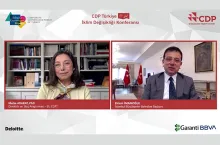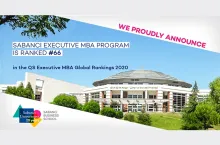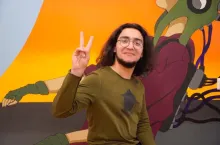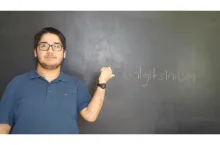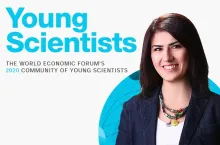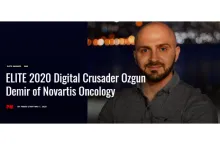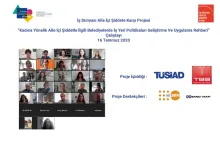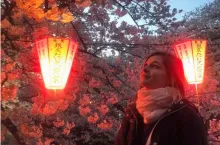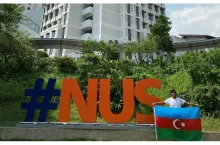28/09/2020
The 2019 Turkey results of CDP, implemented in Turkey by the Sabancı University Corporate Governance Forum Since 2010, were announced to the public at the "CDP Turkey Climate Change 10th Year Conference" held online on Tuesday, June 9, 2020.
The keynote speaker of the conference was Mayor of Istanbul, Ekrem İmamoğlu.

CDP, the world's largest environmental reporting platform whose Turkish leg is implemented by the Sabancı University Corporate Governance Forum, celebrated its 10th year in Turkey with the CDP Turkey Climate Change 10th Year Conference held online on Tuesday, June 9, 2020. Presented in the conference were the annual work of CDP Turkey, whose main sponsor is Garanti BBVA and reporting sponsor is Deloitte Turkey, as well as the CDP Climate Change and Water Program 2019 Turkey Results and CDP Turkey Leaders.
Introductory remarks were given by Sabancı University Corporate Governance Forum Director and Chief Researcher Melsa Ararat and Garanti BBVA Assistant General Manager Ebru Dildar Edin.
Sabancı University Corporate Governance Forum Director and Chief Researcher Melsa Ararat said, "We introduced the CDP project to Turkey 10 years ago. We began by helping companies realize climate change risks and manage them. We regularly reviewed the data and information companies disclosed through the CDP platform to analyze how they manage risks and opportunities, see change over time, and identify trends. We shared results publicly. Today, Turkey is home to global leaders in the area of climate change. In ten years, climate change will evolve into an organizational transformation theme where companies experience systemic risks and new ways of doing business, and adapt these experiences to other areas. The transformation will be a process with which companies that are sensitive to community and social impact, responsible towards all stakeholders, and view profitability as the natural outcome of an organized effort towards a social outcome will create the building blocks of an alternative economic and financial system."
Garanti BBVA Assistant General Manager Ebru Dildar Edin said, “As climate change-related risks and opportunities rise in significance every day, we are delighted to celebrate the 10th year of the world's largest environmental reporting platform CDP in Turkey. We have been among the greatest supporters of CDP since it began in Turkey in 2011. We have only 10 years left to limit the rise of temperature to 1.5 degrees. If we were to make the mistake of going back to the old, linear model of profit- and growth-focused economy, we will lose at least 2 or 3 years, and the decisions we will have to make to offset the lost time will be more radical and challenging. What we need to do as businesses is to take action together, immediately. With this responsibility in mind, we committed to reducing our carbon emissions by 71% until 2035, which is in line with 1.5 degrees as stated by the CDP initiative Science Based Targets. We understand the urgency of climate change and plan to achieve and even exceed this target by the end of 2020. We contribute to Turkey's fight against climate change and transition to a low-carbon economy with innovative financing models that encourage sustainable business models. We would like to thank all companies that report to CDP Turkey and play their part in this fight, and wish for many more 10 years where we turn targets into actions."
KEYNOTE SPEAKER MAYOR OF ISTANBUL EKREM İMAMOĞLU
After introductory remarks, the keynote speaker was Mayor of Istanbul Ekrem İmamoğlu. Ekrem İmamoğlu said, "The world expects care and respect from us. As the relationship of humans to nature is reimagined with the spur of the pandemic, the Istanbul Metropolitan Municipality decided to join the C40 Climate Leadership Group for the first time. This was very well received. We signed a protocol that envisions respect for nature and humans, and joint struggle against climate change. We also made a commitment to implement all aspects of the fight against climate change by the end of 2021. We are taking action in all areas. We will establish an Istanbul Planning Agency in Florya, which will have a section that we call Vision 2050. We plan to do this entirely transparently. The fight against climate change dominates our roadmap in this regard. I would like to thank Sabancı University for their contribution through CDP Turkey."
CDP CLIMATE CHANGE AND WATER PROGRAM 2019 TURKEY RESULTS ANNOUNCED
Sabancı University Corporate Governance Forum - CDP Turkey Projects Director Mirhan Köroğlu Göğüş shared the details of the CDP Climate Change and Water Program 2019 Turkey Results Report. Mirhan Köroğlu Göğüş stated, “This crisis showed us once again how important resilience is to supply chains and business models. Measuring, managing and transparently disclosing environmental risks are essential for the preparedness of companies against all systemic risks that may occur. So it is even more important for companies and cities to continue reporting even during and after the pandemic. We at CDP will continue to work to ensure that reporting processes flow smoothly." Mirhan Köroğlu Göğüş also noted the increase in the number of high-performing Turkish companies on CDP's global rankings, saying that the increase showed not only the growth in the number of Turkish companies that report, but also the improvement in reporting quality over the years.
CDP TURKEY LEADERS AWARDS PRESENTED
CDP has developed one of the most reliable rating methodologies in the world. All companies that report to CDP from around the world are evaluated according to this global methodology. In 2019, seven Turkish respondents were in the leadership category. These seven companies received their “CDP Turkey Leaders” awards at the CDP Turkey Climate Change 10th Year Conference.
Speaking at the ceremony, TÜSİAD Chair Simone Kaslowski said, “It is a great pleasure to present awards to our companies in the 10th year of the excellent platform that is CDP Turkey. These companies fulfill another critical mission by helping to spread awareness as well. I wish their continued success and congratulate them for their outstanding contributions."
Eti Soda was among the 72 Global leaders rated A in the CDP Water Program, and became Global Water Leader. CDP Turkey Climate Leaders were Arçelik, Aselsan, Brisa Bridgestone, Migros and Tekfen Holding, while CDP Turkey Water Leaders were Tekfen Holding and Yapı Kredi Bank. Brisa was also the only Turkish company to be rated A and included among global leaders in CDP’s newly-launched Supplier Engagement Rating (SER) category.
CDP TURKEY LEADERS PANEL HELD

A panel was held with the participation of CDP leader companies after the award ceremony. The moderator of the panel was Sabancı University Faculty Member and Research Chair Oğuz Babüroğlu. Panelists were Brisa Bridgestone CEO Cevdet Alemdar, Tekfen Holding Board of Directors Chair Murat Gigin and Migros Chief Executive Officer Özgür Tort.
Panelists discussed their ways of handling climate change as a strategic issue in the last 10 years, the changes they underwent in the process, and the opportunities those changes brought.
CDP Turkey 2019 Climate Change Report findings
